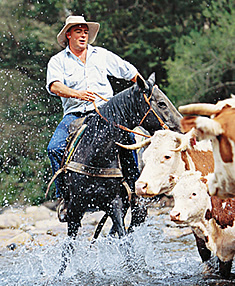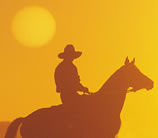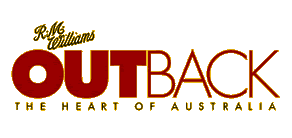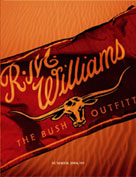OUTBACK PEOPLE
When land counts least
Story Sue Neales Photos Stephan Miechel
Mountain horseman and stockman Chris Stoney is pushing a mob of cattle across the Howqua River at Sheepyard Flat near Mount Timbertop. The river is running clear, the cattle are enjoying their plunge into the mountain stream on a sticky day, while Chris is yelling and whistling at his dogs and the mob from behind as he waves his battered hat in the air with a flourish. Koalas look down from gum trees on the secluded flat as the air rings with mustering mayhem.
It's pure bush magic - with a touch of showmanship thrown in for good measure. But even if this worldly young cattleman is more media savvy than most, nothing can disguise Chris Stoney's horsemanship, nor the natural ease with which he works his dogs and his cows. This isn't surprising, since Chris Stoney, 37, is a fifth-generation local grazier and multiple winner of bush-riding competitions including the Great Mountain Race and the Cattleman's Cup.
 Cattle and horses
and the Stoneys have always seemed to go hand in hand. The images endure
of Chris's father and now politician Graeme Stoney leading a parade
of mountain cattlemen on horseback through downtown Melbourne in 1982, protesting
at plans to cut their access to mountain summer grazing leases; of Chris
mustering mobs of gleaming fat Herefords off the High Plains and mountainsides
before winter; and of his wild brumby-catching rides in the Alpine National
Park, immortalised in television documentaries and in the original and sequel
of the Mansfield-based The Man from Snowy River movies. And of how a young
Chris Stoney, just out of school, launched Stoney's Bluff and Beyond
trailrides, introducing thousands of people to the beauty of the High Plains
in the 17 years it operated before closing last June as a casualty of rising
public liability insurance costs.
Cattle and horses
and the Stoneys have always seemed to go hand in hand. The images endure
of Chris's father and now politician Graeme Stoney leading a parade
of mountain cattlemen on horseback through downtown Melbourne in 1982, protesting
at plans to cut their access to mountain summer grazing leases; of Chris
mustering mobs of gleaming fat Herefords off the High Plains and mountainsides
before winter; and of his wild brumby-catching rides in the Alpine National
Park, immortalised in television documentaries and in the original and sequel
of the Mansfield-based The Man from Snowy River movies. And of how a young
Chris Stoney, just out of school, launched Stoney's Bluff and Beyond
trailrides, introducing thousands of people to the beauty of the High Plains
in the 17 years it operated before closing last June as a casualty of rising
public liability insurance costs.
But what many people long used to seeing him on horseback don't know is how Chris Stoney is channelling his energies into sheep and lamb production since taking over seven years ago as head and sole owner of the family's Minto Pastoral Company. Which is how we come to find ourselves surrounded by thousands of sheep, on a hot, dry day late in March, as Chris and his four staff - all livestock specialists - feed out grain and water in a desperate bid to outlast the worst drought in the Mansfield district's history.
A remarkably cheerful and down-to-earth Chris can still laugh at the public impression that he is inextricably tied solely and forever to mountain cattle. Just as he scorns the idea that his new-look farming operations should revolve around the century-old tradition of taking a mob of 320 cattle up to, and back from, the family's alpine grazing leases near the headwaters of the Howqua River.
"I love the tradition and the actual muster when we take the cows and young calves up in spring and bring them back before it snows," says Chris, who has been taking the cattle up to the mountain pastures since he was a boy. "It's like an annual pilgrimage; it's always been part of my life." But it is time for Minto Pastoral to move forward and to expand its horizons. And for Chris, who took over the family business in 1997 after his parents divorced and assets were sold, that means looking beyond the home station, mountain cattle and Mansfield, and thinking laterally about long-term goals.
"I'm pretty ambitious by nature and it was clear to me when I took over that I would have to look at and do things differently if I wanted the business to expand and grow," he explains. "All I had was a pretty small land holding [just 450 hectares at Minto Glen] and not many other assets. The banks weren't going to lend much on that basis, so I had to look at alternative ways of growing the business."
For Chris, whose ancestors began farming land on the banks of the Goulburn River in 1863 (the original run is now drowned under Lake Eildon), that meant turning on its head the traditional way of looking at land and rural assets. Chris soon realised it was not always the best decision to put business capital into buying land, when it is livestock that produce real returns. Just as city companies often lease their premises, Chris decided to look for long and short-term land leasing and agistment deals - virtually renting pasture for his sheep - instead of owning additional land. At the same time, he took a leaf from the book of the northern cattle kings, and decided to lease pastures in different parts of Victoria and southern NSW, ensuring a geographical spread of country. "The cost of trucking stock is minimal compared to the benefits of spreading the risk of bad seasons," he says. As a third step, he decided Minto would divide its business between beef and lamb production, with two-thirds of income coming from sheep and one-third from the 1200 breeding cows and weaners.
He has now put together a flock of 22,000 sheep, part of which comprises pure Merino ewes that give birth to first-cross progeny, while the other part is first-cross ewes that are crossed with Dorset rams to produce fat lambs for slaughter. Wool is a handy by-product, with 650 bales of medium to fine wool produced each year.
"I'm doing things differently from probably 98 percent of farmers,"
Chris admits. "My philosophy now is that instead of being a landowner,
I am a livestock owner. By preference, I put my capital into buying more
sheep, not more farms. It was the only way I could see to expand. But it
is also about taking the emotion out of owning land. Really, land should
just be about growing grass to feed and fatten stock, not be the end game
in itself."
Chris credits his participation in the two-year Economic Development Program
for young primary producers run by international rural banking specialists
Rabobank with bolstering his confidence and ability to look "outside
the square". Support and informal counsel from other farmers on the
program, who include local Mansfield cattle producer, brumby-catcher and
former vet Rod Manning, has also been vital in encouraging Chris to think,
view and do things differently.
As a consequence, Chris now leases land from other farmers and city-based
rural landowners from north-east Victoria to the Western District. Other
pasture for his flock is leased closer to Melbourne, some long-term, and
some as opportunistic agistment. In addition, using income earned from his
17 years running the horse-riding business, he has bought two land parcels
of 2000 acres each near Mansfield to strategically add to his own home block.
Lessons learned from the family's long involvement with taking cattle
every summer to the High Plains have also been reflected in the way Chris
runs his sheep. Taking cattle off the Mansfield home block during summer
has always given the lowland pastures time to recover and respond more rapidly
to autumn rains, before the herd arrives from the High Country in early
May. Chris now uses the same system with his sheep, which are trucked off
the Mansfield farms in December to graze on wheat and cereal stubble over
summer. To this end, he has pioneered four-month seasonal agistment arrangements
with cereal farmers around Corowa, Sale and Shepparton.
Gazing around Minto Glen in late March, still in the grips of drought, there is not a cow or sheep in sight. With only cracked mud left in the farm dams, almost all have been taken to leased pastures and agistment stubble, except for 2500 young lambs being fattened on grain in a makeshift feedlot. Yet Chris Stoney is keeping his morale high, buoyed by the way his new farming system and philosophy has served him well during the drought. From being a business that couldn't support two families 10 years ago, he now employs four full-time workers and the flock continues to grow.
Coincidentally, the decision to close Bluff and Beyond Trail Rides last year - although traumatic - has turned out to be decisive. Although still abhorring the change in society that means someone else is now always to blame, Chris philosophically acknowledges that after 17 years, it was time for a change. "Knowing when to finish things is always hard, but I decided that after running the rides since I was 20, I'd really been there and done that. Even though we'd taken tens of thousands of people riding and never had an insurance claim, it just wasn't worth risking anymore. As it turned out, with this drought, it has been the right move, because the farm and the business has really been taking all our energies."
But the drought hasn't sapped his ambition. "I'd like
to gain access to more land, preferably as a long-term lease, so we are
looking in the Riverina and in higher rainfall areas around South Gippsland
and Korumburra. To really get the benefits of a geographical spread, I'd
like to end up with a string of leased properties where I run sheep right
across the south-east." His voice tapers off, not wanting to sound
boastful. But he laughs when his gameplan is compared with the vast cattle
empire built up by Sir Sidney Kidman last century. "Oh, don't
say that, I get enough of that from the boys around here already…"
Not that a forthright Chris Stoney is reneging on his vision. "That
is another thing the Rabobank program taught me: that it's OK to be
ambitious and not to be ashamed of what I am trying to achieve, so I'm
sticking to my plan of Minto Pastoral being a specialist in owning stock
not land, and just focussing on growth. At this rate, who know where we
will end up?" ![]()
Full story: OUTBACK, June/July 2003


